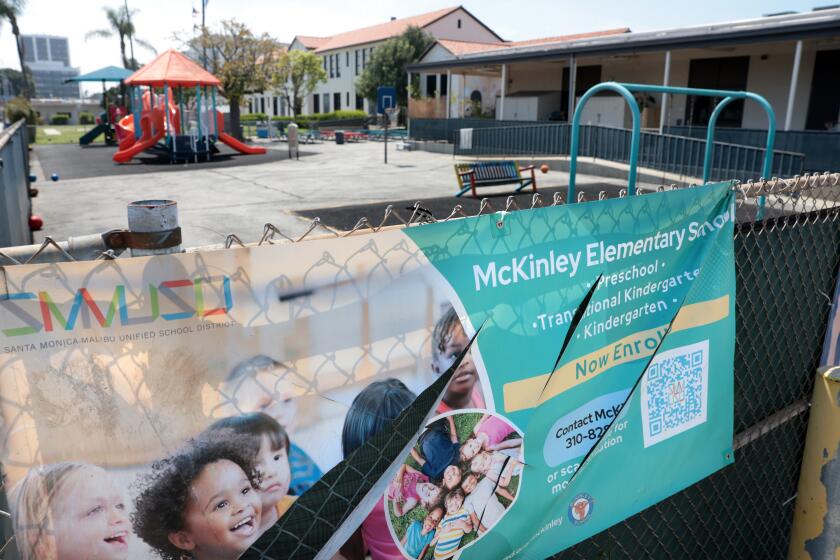‘Home-school charters’ let families use state dollars for Disneyland, horseback riding lessons and more
In California, there’s a way parents can use money from the government to buy multi-day Disneyland Park Hopper passes, San Diego Zoo family memberships, tickets to Medieval Times and dolphin encounters at SeaWorld.
There are a handful of charter schools that give students’ families as much as $2,800 to $3,200 — tax dollars sent to the charter schools — every year to spend on anything they want from a list of thousands of home-school vendors approved by the charters, according to the schools’ websites.
Some home-school vendors offer tutoring, curricula, books and other traditional educational services. Other vendors sell tickets to theme parks that are billed as field trips, or extracurricular activities that are billed as P.E., including parkour classes, acting classes, ice skating lessons, horseback riding lessons and more.
It’s such a popular deal that some home-school bloggers have written articles explaining how California parents can take advantage of the schools’ money.
“If you live in California and you’re not taking advantage of this, I don’t know what to say,” said Karen Akpan, a home-school charter parent of four who lives in Beaumont. She wrote a recent blog article describing how she used the educational funds to pay for a family trip to Disneyland, Chicago CityPASSes and Legoland tickets, as well as computer coding kits, educational toys, books and subscription cooking kits for her kids.
The idea behind these charters, which some call “home-school charters,” is that families can customize their children’s education — just like regular home school — but with state education money.
These charters differ from other, more typical independent study schools or hybrid schools or virtual charter schools, which often assign a structured curriculum of courses for students to complete or offer in-person classes at resource centers.
With home-school charters, there doesn’t have to be a set curriculum. Students only have to meet virtually with a teacher once a month and turn in one work sample for each meeting — a sample that the teacher doesn’t grade, according to parents.
It is difficult to know how many charter schools operate this way. The state doesn’t track them. The California School Boards Assn., which has been critical of charter schools, says it has not researched these kinds of charters because relatively few students enroll in them.
These home-school charters are an uncommon marriage between public charter schools and home schooling, which California considers to be private schooling.
They are an extreme but little-known form of school choice that home-school advocates say is unique to California.
“I don’t know of any states where they’re paying for the kinds of things they’re paying for in California,” said Mike Smith, president of the Home School Legal Defense Assn. a national group that advocates for home-schooling families.
Two of the most popular home-school charters that work this way are Valiant Prep and Inspire Charter School South, both of which were authorized to operate by the Dehesa School District in east San Diego County. Dehesa recently came under scrutiny for allegedly exercising lax oversight with its charter schools.
Dehesa voted in December to renew Inspire’s charter for five more years. Valiant Prep will close at the end of this month, after Dehesa recently voted to not renew it.
San Diego County prosecutors recently alleged in a 235-page indictment that two men behind the corporation A3 Education used Valiant Prep as a cash cow to fraudulently collect millions of dollars from the state for their own personal profit. All but one of the 11 defendants accused in that indictment have pleaded not guilty.
This model of vendor based home-school charters is an easy way to make money, home-school advocates say.
Just like every other California public school, these charters get between $7,571 and $9,269 in base state funding for every student who attends their schools.
Unlike traditional brick-and-mortar district and charter schools, which frequently say they struggle to pay rising costs, home-school charters don’t have to spend much money. They don’t have to pay for rent, utilities or maintenance, for instance. They don’t have to hire administrators to decide the best way to teach children or what curriculum to use.
“Those schools don’t have as many fixed costs as a school that would have a large campus, paying for heat and custodians and all of that. But yet, they get the same amount of money per student from the state,” said Stephanie Hood, a charter school adviser with the Homeschool Assn. of California.
These charters’ functions include paying teachers to connect virtually with students and completing vendor transactions for families, according to parents and the schools’ websites. Vendors must go through background checks and have liability insurance, but parents can request new vendors to add to their school’s list.
It is relatively easy for home-school charters to recruit students, because enrollment happens online and families can request vendors near where they live. Valiant advertised enrollment to families in 34 counties on its website, even though its schools were authorized to operate in only three counties.
“As you know, that’s why some of the problems have occurred, because there’s so much money in it,” Smith said. “It’s very easy to do. ... It’s just ripe for the kind of things that are going on.”
To Smith, home-school charters are antithetical to the point of home schooling, which he believes is to be free of government control over education and to avoid touching education funds. These charters have created a divide within the home-school community between families who pay for home school out of their own pocket and families who opt for the free money, according to Smith.
“They want that money, and they’re willing to give up that freedom to get it,” Smith said.
Smith adds that home schooling isn’t typically expensive; a family can afford enough curriculum and books for $500 to $700 in a year.
Public education dollars should be spent on education, “and that’s it,” he said.
But Hood noted that traditional public schools also send kids on field trips to places like Disneyland.
“If the state is going to allow regular, traditional schools to pay for things like that, I don’t see why that would be a problem,” Hood said.
Home-school charters have grown quickly in recent years.
When Inspire Charter School South first petitioned Dehesa to open in 2015, it told Dehesa it planned to start with 135 students and grow to 1,080 students by year five. Instead, it exploded from 826 students in 2015 to about 4,466 students this school year, according to state enrollment data. Almost half of its students are in grades K-3.
The Valiant school that Dehesa authorized also grew rapidly from 33 students in 2014 to 2,550 students this school year, although prosecutors believe some of those students are not really Valiant students. The indictment alleges that some of Valiant’s enrollment was faked.
Meanwhile, these schools perform worse than average on state tests. About 66 percent of Valiant students failed the state test in English and 83 percent failed in math last year, while 57 percent of Inspire students failed in English and 77 percent did so in math.
The principal of Inspire Charter School South, Jennifer Lorge, declined to comment for this story. A lawyer for Valiant’s head of school, Justin Schmitt, also declined to comment. Schmitt is one of 11 defendants named in the indictment regarding A3 charter schools.
As controversial as vendor-based home-school charters are, several families attest that Valiant has helped their children more than traditional public schools could have.
Akpan says her kids are learning plenty. Instead of reading about geography and other countries, her four kids — ages 4 to 6 — have actually visited them. Last year alone, Akpan’s family traveled to Morocco, New Zealand, Mexico, England, Italy, China and Denmark.
“My son says, ‘I know where China is; I’ve already been there’,” Akpan said. “It’s kind of going over what they already know.”
She said she doesn’t use any curriculum for her kids, aside from a few workbooks to provide math problems and other subject material. Not using a set curriculum allows her kids to pursue what they are most interested in, she said. One of her kids loves math best, while another loves writing and another loves building things.
“I don’t want to be boxed into any curriculum. With Valiant, there’s no requirement to use any curriculum,” Akpan said. “That’s a very big thing for me.”
Another Valiant parent, Theresa Rivera, says her 7-year-old son suffered socially and academically in brick-and-mortar schools.
He has ADHD and a learning disability and was shunned by his classmates. He was constantly behind academically, so he got frustrated and misbehaved to get out of doing schoolwork, she said; she was used to getting calls from the school to pick him up early and emails from teachers describing his bad behavior.
In kindergarten, he was in a classroom with 26 students, so the teacher had little time to help him catch up, Rivera said.
“I wanna do what’s best for my son, and he learns differently,” she said. “It doesn’t mean he can’t learn or will never learn. It just takes him a little bit longer, and public school doesn’t give him the time to do that.”
She uses her educational funds to pay for equine therapy for her son, which has helped him calm his behavior and gain self-confidence, she said. She also has bought swim lessons, books, adaptive writing materials and science kits.
“I can customize his education to allow him to feel confident in a way that he wasn’t feeling in public school,” she said.
Since joining Valiant, Rivera said, her son has less frustration, anxiety and explosive behavior. He’s happier. The special-education teacher and educational coach that Valiant provided were helpful too, she said.
Valiant has been a good thing for her son, and that’s what makes the news of the indictment so disheartening, Rivera said.
“Everyone was trying to do what’s best for the students,” Rivera said. “We thought we were part of this great educational opportunity to improve our children’s lives, and behind the scenes, these guys were just using us to build their wealthy empire, I guess.”
Both Akpan and Rivera said they will enroll in Inspire now that Valiant is closing.
More to Read
Start your day right
Sign up for Essential California for news, features and recommendations from the L.A. Times and beyond in your inbox six days a week.
You may occasionally receive promotional content from the Los Angeles Times.






